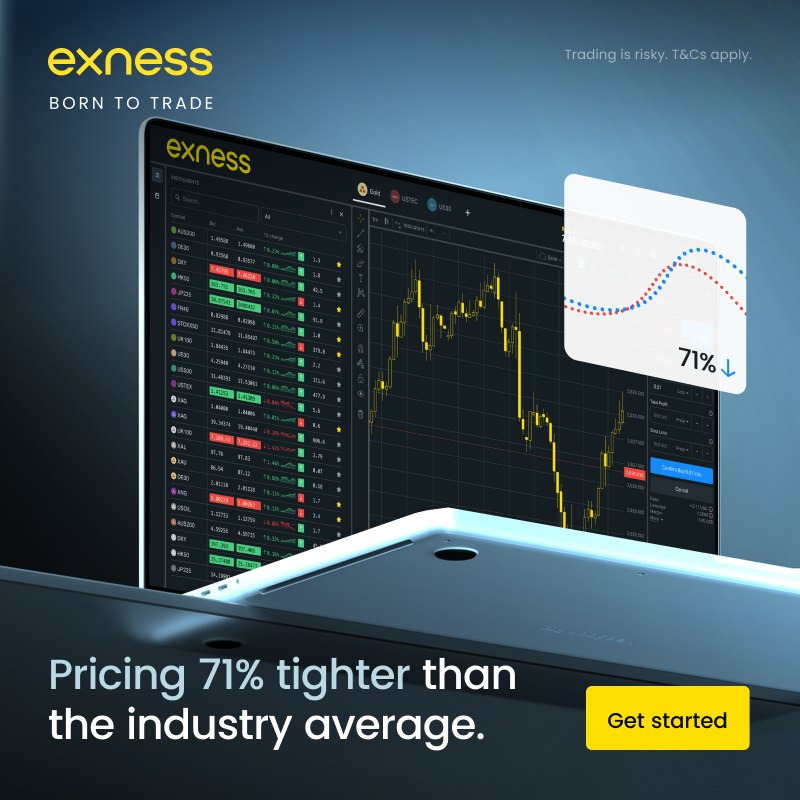
4 minute read
Understanding leverage in Exness: A complete guide
Leverage is one of the most powerful tools in forex trading — but it can also be one of the riskiest if misunderstood. If you’re trading on Exness, it’s important to fully understand how leverage works and how to use it smartly.
In this guide, we’ll explain what leverage is in Exness, how to set it up, and how to manage it without losing your entire trading account.
👉 Start trading with Exness and customize your leverage today
EXNESS FOREX Broker Review 2025: Pros and Cons

What is Leverage in Forex Trading?
Leverage allows you to control a larger trade size with a smaller amount of capital. Think of it like a magnifying glass — it can amplify both profits and losses.
For example:
With 1:100 leverage, your $100 can open a $10,000 position.
If the price moves in your favor by 1%, you profit $100.
If it moves against you by 1%, you lose your full balance.
That’s why leverage must be handled with discipline and strategy.
Why Leverage Matters in Forex Trading
Without leverage, most traders wouldn’t be able to participate in the forex market. Currencies often move just a few points per day, so leverage:
Increases profit potential
Allows access to larger markets
Lets small accounts trade big positions
But misuse leads to margin calls or liquidation, where your trades are automatically closed by the broker.
How Leverage Works on Exness Platform
When you open a trade on Exness, your account funds act as a margin deposit. The rest of the trade amount is temporarily “borrowed” from the broker based on your chosen leverage.
For instance, at 1:500 leverage:
To open a $5,000 position, you only need $10
The remaining amount is covered by Exness
If your account equity drops too low, the trade may close
👉 Create an Exness account and explore leverage trading here

Leverage Options in Exness
Exness offers 3 main leverage types:
Unlimited Leverage
Available on certain accounts with low balances
Requires no open trades and specific conditions met
Dynamic Leverage
Adjusts based on your account equity
Higher balance = lower maximum leverage
Fixed Leverage
You set the leverage manually (e.g., 1:100 or 1:2000)
Useful for controlled risk strategies
You may also need:
is EXNESS a prop firm? What type of broker is EXNESS?
is EXNESS a good broker for beginners
is EXNESS legal in DUBAI UAE or not? Review
Exness Leverage by Account Type
Account Type
Standard 1:Unlimited
Pro 1:2000
Raw Spread 1:2000
Zero 1:2000
Note: Some instruments like cryptocurrencies and stocks have capped leverage limits.
How to Set or Change Leverage in Exness
Changing your leverage is simple. Just follow these steps:
Log into your Exness Personal Area
Choose your trading account
Click on “Settings” → “Change Leverage”
Pick your preferred leverage ratio
Confirm and apply the change
👉 Click here to adjust leverage inside your Exness dashboard
You must close all open positions before changing leverage.
Leverage Examples: Small vs Large Trades
Example 1 – Low Leverage (1:50)
Deposit: $100
Trade size: $5,000
1% profit = $50 gain
Safer, slower growth
Example 2 – High Leverage (1:1000)
Deposit: $100
Trade size: $100,000
1% profit = $1,000 gain
But a 1% loss = your full account is gone
That’s why higher leverage should only be used with strong risk management.
Risk Management When Using Leverage
Here’s how to avoid blowing your account:
Use a stop loss on every trade
Risk only 1–2% of your capital per trade
Keep margin level above 100%
Don’t let emotions drive your decisions
Use a demo account to test high leverage first
Common Mistakes Traders Make With Leverage
Overleveraging – Opening too large positions
No risk plan – Trading blindly without stop loss
Chasing losses – Trying to recover by increasing size
Ignoring margin warnings – Leads to forced liquidation
Remember, the goal isn’t just to win trades — it’s to stay in the game long enough to win consistently.
FAQs
1. What’s the maximum leverage in Exness?
Up to 1:Unlimited, depending on account type and equity.
2. Is it safe to use high leverage?
Only if used with strict risk controls and proper lot sizing.
3. Can I change leverage any time?
Yes — but only when you don’t have active trades.
4. Does high leverage mean more profit?
Yes, but also more risk. Leverage magnifies both sides.
5. Do I need leverage to trade forex?
Not required, but helpful if you have a small deposit.
6. How can I practice using leverage?
Start with a demo account on Exness to test safely.
Conclusion
Understanding leverage is essential to becoming a successful forex trader — especially when using platforms like Exness that offer flexible, customizable options. Whether you're conservative or aggressive, smart leverage use can help you maximize opportunity while controlling risk.
👉 Start trading with Exness and customize your leverage today
See more:
How To Open EXNESS Account in UAE
How To Open EXNESS Account in Metatrader 5 (MT5)










